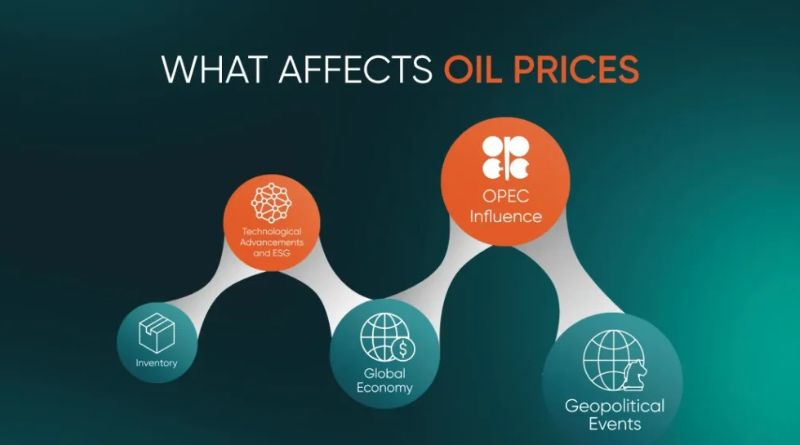Crude oil, one of the most vital resources in the global economy, plays a central role in shaping the cost of energy, transportation, and manufacturing goods. The price of crude oil influences everything from gas prices at the pump to the cost of heating homes and operating factories. In this article, we’ll explore what drives the price of crude oil, the key factors that influence its fluctuations, and how its price affects global markets.
Table of Contents
What is Crude Oil?
Crude oil is a naturally occurring, unrefined petroleum product that is extracted from the earth. It is a mixture of hydrocarbons (organic compounds made of hydrogen and carbon) and other organic materials. Once refined, crude oil becomes usable fuels such as gasoline, diesel, and jet fuel, as well as products like plastics, chemicals, and synthetic materials. The price of crude oil is often considered a key indicator of the global economy, as its availability and cost affect everything from transportation to industrial production.
Factors Affecting Crude Oil Price
Crude oil prices are influenced by a variety of factors, many of which are interconnected and can change rapidly. Some of the most significant factors include:
1. Supply and Demand
The most fundamental driver of any commodity’s price is the balance between supply and demand. If demand for crude oil increases while supply remains constant or decreases, the price of oil typically rises. Conversely, if oil production surges or demand falls, prices tend to drop.
Demand for crude oil is largely driven by global economic growth. As economies expand, particularly in emerging markets, demand for oil increases due to higher consumption in transportation, manufacturing, and energy production. Conversely, when economic growth slows down, as seen during recessions, demand for oil generally decreases, leading to lower prices.
On the supply side, factors like oil production rates, geopolitical tensions, and the discovery of new reserves can affect the amount of crude oil available on the market. For example, OPEC (Organization of the Petroleum Exporting Countries) decisions to reduce or increase oil output can significantly influence supply and, by extension, prices.
2. Geopolitical Events
Political instability in key oil-producing regions often causes fluctuations in crude oil prices. For instance, tensions in the Middle East—home to some of the world’s largest oil producers—can lead to fears of supply disruptions, pushing prices higher. Conflicts in oil-rich countries like Venezuela or Nigeria, sanctions on countries like Iran, or major trade disputes can also impact oil production and global supply.
Natural disasters, like hurricanes in the Gulf of Mexico (where much of the U.S. oil production is located), can temporarily disrupt supply chains, causing a spike in prices.
3. Currency Strength
Crude oil is globally traded in U.S. dollars. As a result, the strength of the U.S. dollar relative to other currencies can influence oil prices. When the dollar strengthens, oil becomes more expensive for buyers holding other currencies, which can decrease global demand and lead to lower oil prices. Conversely, when the dollar weakens, oil becomes cheaper in other currencies, often resulting in higher demand and rising prices.
4. OPEC and Non-OPEC Production
The Organization of the Petroleum Exporting Countries (OPEC) plays a significant role in regulating oil prices by managing the supply of crude oil. OPEC member countries collectively agree to increase or decrease oil production to stabilize or influence prices. In recent years, OPEC+—which includes non-OPEC countries like Russia—has been a key player in setting production targets and influencing the global supply of crude oil.
When OPEC+ countries decide to cut production, it often leads to higher prices due to a tighter supply. On the other hand, when they increase production to meet growing demand, prices tend to fall.
5. Oil Inventories and Stockpiles
Oil inventories, especially those held by countries like the United States, serve as a key indicator of the health of global oil markets. High levels of oil in storage indicate that supply is outpacing demand, which can lead to lower prices. Conversely, when inventories are low, it signals that demand is strong, which can drive prices higher.
6. Market Speculation
Financial markets play a significant role in setting crude oil prices. Investors and traders often buy and sell oil futures contracts based on predictions about the future price of oil. Speculation can lead to short-term fluctuations in oil prices, especially if there’s a major geopolitical event or economic announcement.
Current Trends in Crude Oil Prices
Crude oil prices have seen significant volatility over the years, driven by shifting global demand, supply disruptions, and economic cycles. In recent years, the price of crude oil has faced dramatic ups and downs, largely influenced by the COVID-19 pandemic and its impact on global travel and industrial activity.
As countries begin to recover from the pandemic, oil prices have steadily increased due to growing demand as economic activity resumes. However, geopolitical tensions, particularly the conflict between Russia and Ukraine, have disrupted oil supply chains, resulting in price spikes. Additionally, OPEC+ production decisions and efforts to transition toward renewable energy sources have further complicated oil price trends.
How Crude Oil Prices Affect the Economy
Crude oil prices have far-reaching effects on the global economy. Here are a few ways that oil price changes impact consumers and businesses:
1. Gasoline Prices
One of the most visible effects of fluctuating crude oil prices is on gasoline prices. As crude oil prices rise, so too do the costs of refining and distributing gasoline, which ultimately results in higher prices at the pump. This can lead to increased costs for consumers, especially in regions heavily dependent on transportation.
2. Energy Costs
Crude oil is used not only for gasoline but also for heating, electricity generation, and industrial purposes. When crude oil prices rise, so do energy costs, which can affect consumers’ utility bills and businesses’ operating expenses.
3. Inflation
Higher oil prices can contribute to inflation, particularly in industries reliant on fuel for transportation or manufacturing. Rising transportation and shipping costs can increase the price of goods and services, further contributing to inflationary pressures.
4. Economic Growth
Countries that are net importers of oil are more vulnerable to rising oil prices, as they must spend more on imports, which can dampen economic growth. Conversely, oil-exporting nations may benefit from higher oil prices, as their revenues increase with higher prices.
FAQs About Crude Oil Prices
1. What is the current price of crude oil?
Crude oil prices fluctuate daily based on market conditions, geopolitical events, and other factors. You can check the latest crude oil prices through financial news sources, commodity market platforms, or government reports.
2. Why do oil prices change so frequently?
Oil prices change frequently due to a combination of supply and demand factors, geopolitical tensions, changes in currency values, and market speculation. The global nature of the oil market makes it sensitive to a wide range of influences.
3. How do OPEC decisions affect oil prices?
OPEC, and more recently OPEC+, can influence oil prices by adjusting production levels. When OPEC cuts production, it tightens the supply of oil, which can cause prices to rise. Conversely, when production is increased, oil prices tend to fall.
4. Can crude oil prices affect my everyday life?
Yes, crude oil prices can affect you directly through higher gasoline prices, increased energy costs, and even higher prices for everyday goods, as transportation and production costs rise.
5. What is the difference between Brent Crude and WTI Crude?
Brent Crude and West Texas Intermediate (WTI) Crude are two major types of crude oil. Brent Crude is primarily extracted from the North Sea and is used as a benchmark for oil prices in Europe, the Middle East, and Africa. WTI Crude is extracted from the United States and serves as a benchmark for North American oil prices.
Conclusion
The price of crude oil is an essential barometer of the global economy, affecting everything from transportation costs to the cost of goods. Understanding the factors that influence crude oil prices, such as supply and demand, geopolitical events, and market speculation, can help investors, consumers, and policymakers make informed decisions. Given the volatility of the oil market, staying informed about global developments and trends is key to navigating the complexities of the crude oil market.



